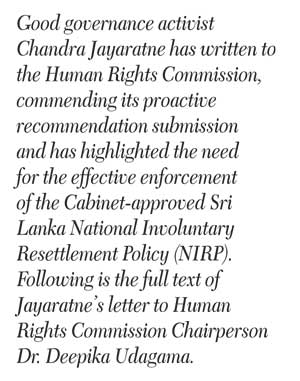Friday Feb 27, 2026
Friday Feb 27, 2026
Tuesday, 26 January 2016 00:00 - - {{hitsCtrl.values.hits}}
 Request for a Proactive Recommendation Submission by the Human Rights Commission re; Effective Enforcement of the Cabinet Approved Sri Lanka National Involuntary Resettlement Policy (NIRP)
Request for a Proactive Recommendation Submission by the Human Rights Commission re; Effective Enforcement of the Cabinet Approved Sri Lanka National Involuntary Resettlement Policy (NIRP)
I congratulate you and your fellow commissioners, and highly recognise the recent proactive recommendation by the Human Rights Commission, appealing to the President to abolish the death penalty in Sri Lanka.
You will recognise that with several of the development initiatives planned by the Government, including the Megapolis Development plan due to be formally launched effective 29 January, 2016, could give rise to a significant number of involuntary displacements of citizens, especially the poor and marginalised segment of our communities.
I welcome the assurances given by the Government and several key ministers that no one will be forcibly relocated, and that due process will be followed for any land acquisition in connection with the megapolis and other key development projects. However, I believe, it is inevitable, that large scale displacements associated with these projects will arise, and will need to be effectively managed in order to ensure the rights of the affected communities are duly safeguarded.
In the above context I call on you and your fellow commissioners, to proactively review the likely impact on rights of the affected communities, consequent to these projects being initiated and recommend to the government, “wherever involuntary displacements are essential for the advancement of the national economy, in order to assure long term sustainable prosperity of the nation and all its citizens, that the National Involuntary Resettlement Policy, introduced by the government in 2001, will be:
a) Updated where needed to reflect the best international safeguards and standards, and
b) Applied in all cases, where relocation or land acquisition is found to be absolutely necessary.
You will recognise that Land Acquisition Act (LAA) provides compensation only for land, structures, and crops and provisions are not available to address other key resettlement issues, to mitigate or avoid impacts on people resulting from such land acquisitions. In addition, non-titled people and other dependents on land cannot be assisted under the LAA. To address the current gaps in the LAA in addressing the key resettlement issues, such as exploring alternative project options that avoid or minimise impacts on people, the Government of Sri Lanka (through the cabinet of Ministers) adopted the National Policy on Involuntary Resettlement (NIRP) on the 24th May 2001. The NIRP also highlights the need for consultation of Displaced Person’s (DP’s) and their participation in the resettlement process actively.
The Central Environment Authority (CEA) was tasked to review and approve Resettlement Plans (RPs) prepared by project executing agencies. These plans are also required to be publicly available. In addition to NIRP, Asian Development Bank’s Safeguard Policy Statement, 2009 have similar requirements and guidelines reinforcing each other.” (Refer Section 2.2 of Resettlement Plan – Road Development Authority http://www.rda.gov.lk/supported/noticeboard/publications/nhsp/resettlement_Imp_plans_2012/B207.pdf ).
The aforesaid policy sets out the following key principles and policy commitments;
1. Public and private sector development projects increasingly involve acquisition of land. People whose homes and lands are acquired then have to move elsewhere and resettle in locations that may be unfamiliar. In general, resettlement has not been very successful and there are several recent examples in Sri Lanka where people have shown resistance to projects that cause displacement. Among the significant consequences of poor resettlement has been impoverishment of affected people due to landlessness, homelessness, joblessness, relatively higher mortality and morbidity, food insecurity, lack of access to common property and public services including education of children, and disruption of the existing social organisation.
2. To ensure that people affected by development projects are treated in a fair and equitable manner, and that they are not impoverished in the process, it is necessary that Sri Lanka adopts a NIRP.
3. The policy proposed refers only to development-induced involuntary resettlement, where the option to stay behind does not exist. It does, however, also apply to cases where people do not have to be physically relocated.
4. Objectives of the policy are;
• To avoid, minimise and mitigate negative impacts of involuntary resettlement by facilitating the reestablishment of the affected people on a productive and self-sustaining basis. The policy should also facilitate the development of the project-affected people and the project.

• To ensure that people adversely affected by development projects are fully and promptly compensated and successfully resettled. The livelihoods of the displaced persons should be re-established and the standard of living improved.
• To ensure that no impoverishment of people shall result as a consequence of compulsory land acquisition for development purposes by the State.
• To assist adversely affected people in dealing with the psychological, cultural, social and other stresses caused by compulsory land acquisition.
• To make all affected people aware of processes available for the redress of grievances that are easily accessible and immediately responsive.
• To have in place a consultative, transparent and accountable involuntary resettlement process with a time frame agreed to by the Project Executing Agencies (PEA) and the affected people.
5. Policy principles
• Involuntary resettlement should be avoided or reduced as much as possible by reviewing alternatives to the project as well as alternatives within the project.
• Where involuntary resettlement is unavoidable, affected people should be assisted to re-establish themselves and improve their quality of life.
• Gender equality and equity should be ensured and adhered to throughout the policy.
• Affected persons should be fully involved in the selection of relocation sites, livelihood compensation and development options at the earliest opportunity.
• Replacement land should be an option for compensation in the case of loss of land; in the absence of replacement land cash compensation should be an option for all affected persons
• Compensation for loss of land, structures, other assets and income should be based on full replacement cost and should be paid promptly. This should include transaction costs.
• Resettlement should be planned and implemented with full participation of the provincial and local authorities.
• To assist those affected to be economically and socially integrated into the host communities; participatory measures should be designed and implemented.
• Common property resources and community and public services should be provided to affected people.
• Resettlement should be planned as a development activity for the affected people.
• Affected persons who do not have documented title to land should receive fair and just treatment.
• Vulnerable groups should be identified and given appropriate assistance to substantially improve their living standards.
• Project Executing Agencies should bear the full costs of compensation and resettlement.
The NIRP has been most effectively applied in mitigating the negative impacts of involuntary resettlement on communities negatively impacted by the Southern Highway Development project. These impacted communities were duly satisfied by compensation packages being available to those involuntarily resettled, with due compensation paid to ameliorate the following negative impacts;
1. Market value of the land acquired.
2. The replacement cost of the property and crops left behind and to be re-established in newly resettled place.
3. The discounted present value of future family incomes and livelihood supportive future cash flows foregone as a consequence of involuntary resettlements and thus ensure that the affected persons are able to restore their lives and livelihoods to the levels previously enjoyed.
4. Additional costs and liabilities incurred through the resettlement process, including the additional premiums paid on replacement land acquisition, if applicable, as well as the discounted present value of future additional family expenses and costs due to resettlement and thus ensure that the affected persons are able to restore their lives and livelihoods to the levels previously enjoyed.
If a similar process is adopted and a compensation package similar to that applied in the case of the Southern Highway Development project is offered to the communities who are involuntarily resettled, you will note that at least in financial terms, they are compensated on a fair and equitable basis to a level which ensures that their future lives and livelihoods can be restored.
The successful resettlements achieved under the Southern Highway Project were mainly due to the following;
• The communities resettled were made aware of their rights and collective strengths to be gained through effective knowledge sharing and being organised as an empowered and united community, with external hand holding support from caring and knowledgeable civil society groups.
• Enhancing the negotiations capability and collective group strength in bargaining of the affected communities.
• Officials representing the Executive following a well documented transparent processes and procedures, and being open to effective professional negotiations.
• Legal challenges being made on behalf of the affected communities. These were swiftly disposed of ensuring fairness and equity.
• The Compliance processes insisted from local implementing agencies by the multi-lateral financing agencies, especially the Asian Development Bank.
• The line of credit made available to the Government by the multi-lateral financing agencies.
In the context of the above experiences, which are well documented and set out in professional publications (e.g.- Right of Way- A journey of resettlement by Shani Jayawardena – A Centre for poverty analysis publication), I believe there may be some alternative new options to be applied in providing solutions to the communities negatively impacted by involuntary resettlements in the future.
These new options may include;
• The Human Rights Commission reviewing above in detail and developing a “way forward strategy” and an associated recommendations to the Government.
• Encouraging independent Civil Society groups involved in the Southern Highway project to share their experiences and options with the impacted communities and empower them to become an effective collective bargaining group in any future negotiations.
• Advocacy calling for options similar to those in NIRP to be extended to the involuntarily resettled communities.
• Seeking the support of Independent Civil Society Groups to assist adversely affected people in dealing with the psychological, cultural, social and other stresses caused by compulsory land acquisition.
• Encouraging a series of test cases to be filed by the impacted communities, seeking judicial redress by the application of the NIRP to the involuntarily resettled communities in the Northern Province.
I trust the above submission will be of value to you in serving the interests of the involuntarily resettled communities in the country.
I will be pleased to provide any further information that may be required in the review of this submission.
Yours sincerely,
Chandra Jayaratne